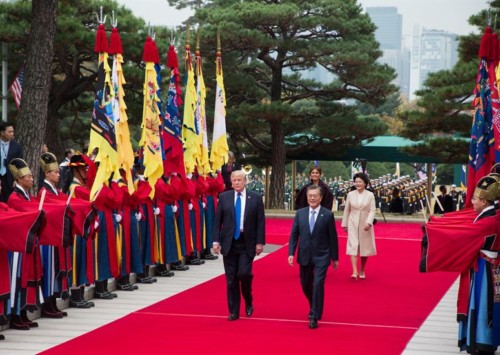US plans to withdraw from the INF Treaty

The US says it is forced to abandon the INF Treaty as the Russians have been violating it consistently
By threatening to pull out of a key arms treaty, the United States has brought Europe back to the brink of a cold war.
There is never a good time for starting an arms race, but for Europe the news of possible termination by the United States of a nuclear arms treaty could not have come at a worse time.
Europe is already in deep paroxysms and uncertainty over the way Brexit is lurching ahead blindly. To add to it, the famous Franco-German engine that has been giving a direction and power to the European Union (EU) has become entirely dysfunctional since the election of Emmanuel Macron as the President of France and the severe setbacks suffered by chancellor Angela Merkel in Germany. The two leaders sharing a relationship that seems almost cold in comparison with the ties between earlier heads of the two nations right from the end of the second world war, nearly 75 years ago.
Thus, the announcement by the Trump administration that it will back out of the Intermediate range Nuclear Forces (INF) Treaty unless Russia urgently mends its ways has come like a bolt from the blue for an EU that has been bitterly divided, listless and directionless for several years now. The INF Treaty, signed in 1987 by the then US President Ronald Reagan and Soviet leader Mikhail Gorbachev put an end to the testing and deployment of land-based or airborne nuclear-tipped missiles with ranges between 500 and 5500 km.
The treaty had come as a big relief to Europe as the ban meant that the entire European territory was literally free of NATO and Warsaw Pact forces’ nuclear missiles targeting each other and in many ways it signaled the end of the cold war in the European theatre. The two sides went on to not just pull back the missiles from deployment, but also undertook large-scale destruction of thousands of missiles.
The US says it is forced to abandon the INF Treaty as the Russians have been violating it consistently, having developed numerous missiles that fall under the limits of the treaty and hence should be destroyed. They are particularly worried about the 9M729 missile that the Russians have developed and deployed as a key part of their strategic plans especially since the development and modernisation of their conventional weapons has not kept pace with the NATO forces or even China. Over 100 such missiles are believed to have been deployed by Russia just east of Urals and also near the Caspian Sea, upsetting the US as these missiles bring the entire Europe within their range.
The US is also upset that many other countries that have not signed the INF Treaty, notably China, but also Iran, Pakistan and India have developed a large arsenal of missiles, precisely in the 500-5500 km, leaving the US and NATO the outsiders in this game. Hence, the US is keen to get back into this segment to complement its missile forces.
While the US may have its reasons to ditch the treaty, the Europeans don’t share the same vision and more significantly the implications of the INF Treaty getting scrapped.
Thirty years on, a lot has changed on the ground in Europe. Warsaw Pact has disappeared and most of the former members of this pact are either members of NATO or the European Union or both. And a return to the cold war or any other war for that matter is definitely anathema to the millennials of the EU as well as broader public opinion and several governments. Also, the Europe of today is heavily divided with many countries adopting a rather harsh stance against Russia, while there remains a fair amount of noises for engaging the Russians in talks instead.
Leaders in countries like Poland and even Hungary and the Baltics would actually be happy to have the US missiles back on their territory as they fear to be the first in line of any possible Russian attack and hence remain vulnerable.
But other nations, notably Germany, the largest member of the EU, is less than keen on getting any missiles, let alone nuclear missiles in its backyard. With the rapid rise of the Green Party, which is fiercely anti-nuclear, the German people and the government would be reluctant to have a return to the cold war scenario.
Another big challenge for Europe is the weakening of the Franco-German engine which has so far guided and given strength to the EU, in not just its enlargement but also in deepening the intra-EU ties. However, German chancellor Angela Merkel and French President Emmanuel Macron just don’t get along and have a very different view of crucial issues, even in strengthening the EU’s own defence capabilities.
Both the leaders are currently busy peddling their own versions of creating a joint European defence force that can either supplement or even entirely replace the national armies of different member states. A bigger challenge for the EU-member states in boosting their defence capabilities is that their spending on defence is far below the mark of 2 pc of the GDP that the NATO has set as a benchmark and which almost all countries miss currently, often by wide margin.
If the EU leaders cannot rapidly agree on a common strategy to respond to the US position on INF or to convince the Americans to use other means of convincing the Russians to toe the line, it is very likely that President Trump would go ahead and tear up the treaty and then willy-nilly the EU will get pulled back in a renewed cold war.










